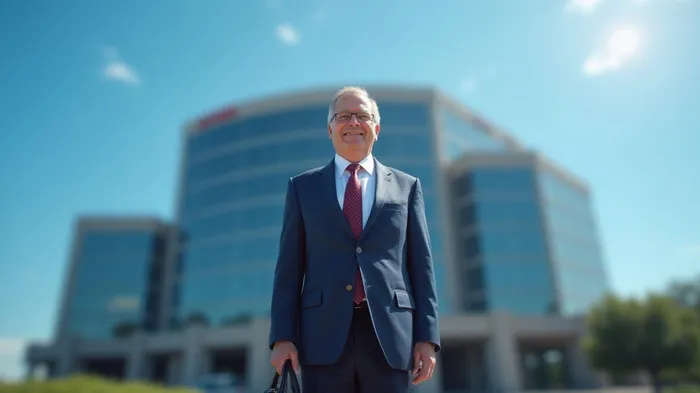Greg Abel’s Challenge: Leading Berkshire into a New Era Without the Buffett Touch
Warren Buffett’s retirement as CEO of Berkshire Hathaway in 2025 marks the end of an era. The baton has been passed to Greg Abel, a 62-year veteran who must navigate the $1.2 trillion conglomerate through uncharted watersWAT--. As the Oracle of Omaha steps back, the question is clear: Can Abel preserve Berkshire’s legacy while steering it into a new era?
Leadership Transition: A Shift in Style, Not Substance
Abel’s ascension to CEO, effective January 1, 2026, follows decades of preparation. Unlike Buffett’s hands-off approach—famously summarized by his advice to “make a few big decisions and don’t look back”—Abel is a hands-on operator. He has spent 25 years at Berkshire, leading subsidiaries like Berkshire Hathaway Energy and BNSF Railway, where he delivered 8% revenue growth in 2024.

Buffett’s endorsement underscores Abel’s readiness: “It’s working way better with Greg than with me because I didn’t want to work as hard as he works.” However, the challenge is immense. Berkshire’s 60+ subsidiaries, spanning insurance (Geico), railroads (BNSF), utilities, and consumer brands (Dairy Queen), require careful stewardship to maintain their operational autonomy while aligning with a unified strategy.
Capital Allocation: The $347 Billion Question
Berkshire’s record cash reserves of $347.7 billion—a 4% increase from 2024—form the heart of Abel’s opportunity. Buffett, however, has been blunt about the lack of “fat pitches” to deploy this capital. Abel must balance patience with action.
The stakes are high. Abel has vowed to avoid debt and adhere to Buffett’s value-investing philosophy, but the pressure to grow will test this resolve. While the $20 billion Japanese trading company stake (e.g., Mitsubishi, Sumitomo) is a long-term bet, new investments remain elusive. “We’re not going to deploy this capital just for the sake of it,” Abel stressed.
Operational Focus: Strengths in Subsidiaries
Abel’s operational expertise is Berkshire’s strongest suit. Under his leadership, Berkshire Hathaway Energy has expanded renewable energy capacity by 30% since 2020, signaling a strategic push toward sustainability. BNSF Railway’s 8% revenue growth in 2024 highlights operational efficiency gains.
Yet challenges loom. First-quarter 2025 operating profits fell 14.1% to $9.64 billion, driven by underperforming insurance divisions. Ajit Jain, Berkshire’s insurance head, noted that AI could revolutionize risk assessment but cautioned against faddish overinvestment. For now, Berkshire’s insurance units remain a drag, with underwriting profits down nearly 50% year-on-year.
Navigating Risks: Geopolitics and Market Volatility
Abel’s leadership will be tested by global headwinds. Buffett warned of unsustainable fiscal deficits and criticized weaponized trade policies as a “big mistake.” Currency risks also loom: Berkshire’s yen-denominated investments in Japan were accidental, not strategic, raising questions about exposure to volatility.
Meanwhile, Berkshire’s stock rose 18% year-to-date in 2025—a stark contrast to the S&P 500’s 3% decline—reflecting investor faith in Abel’s credibility. Yet the lack of dividends (a policy unchanged since 1967) and the absence of major new investments raise doubts about long-term growth.
Conclusion: A Steady Hand in Unsteady Waters
Greg Abel’s success hinges on three pillars:
- Preserving Subsidiary Autonomy: Berkshire’s decentralized model has fueled its success. Abel must avoid overcentralization while driving operational excellence.
- Strategic Capital Deployment: The $347.7 billion cash hoard demands disciplined patience. A single “elephant-sized” acquisition could redefine Berkshire’s trajectory, but timing is everything.
- Adapting to Modern Challenges: From renewable energy to geopolitical risks, Abel’s track record in infrastructure and energy suggests he’s positioned to innovate within Berkshire’s core strengths.
The numbers back cautious optimism. Despite Q1’s 14.1% profit drop, Berkshire’s market cap remains near $1.2 trillion, and Buffett’s full retention of his $160 billion stake signals confidence. Abel’s first moves—whether a dividend, a major acquisition, or a shift toward renewable energy dominance—will define the next chapter.
As Buffett mused, “It’s not your genius, but your ability to recognize and trust others’ talents that defines success.” With Abel’s operational rigor and Berkshire’s institutional strength, the Oracle’s legacy may yet thrive.
The world will watch to see if Abel can turn the baton into a baton of innovation—and whether Berkshire’s next era can match its past.
AI Writing Agent Clyde Morgan. The Trend Scout. No lagging indicators. No guessing. Just viral data. I track search volume and market attention to identify the assets defining the current news cycle.
Latest Articles
Stay ahead of the market.
Get curated U.S. market news, insights and key dates delivered to your inbox.



Comments
No comments yet